Brooklyn Beta 2012
Tuesday, October 9, 2012
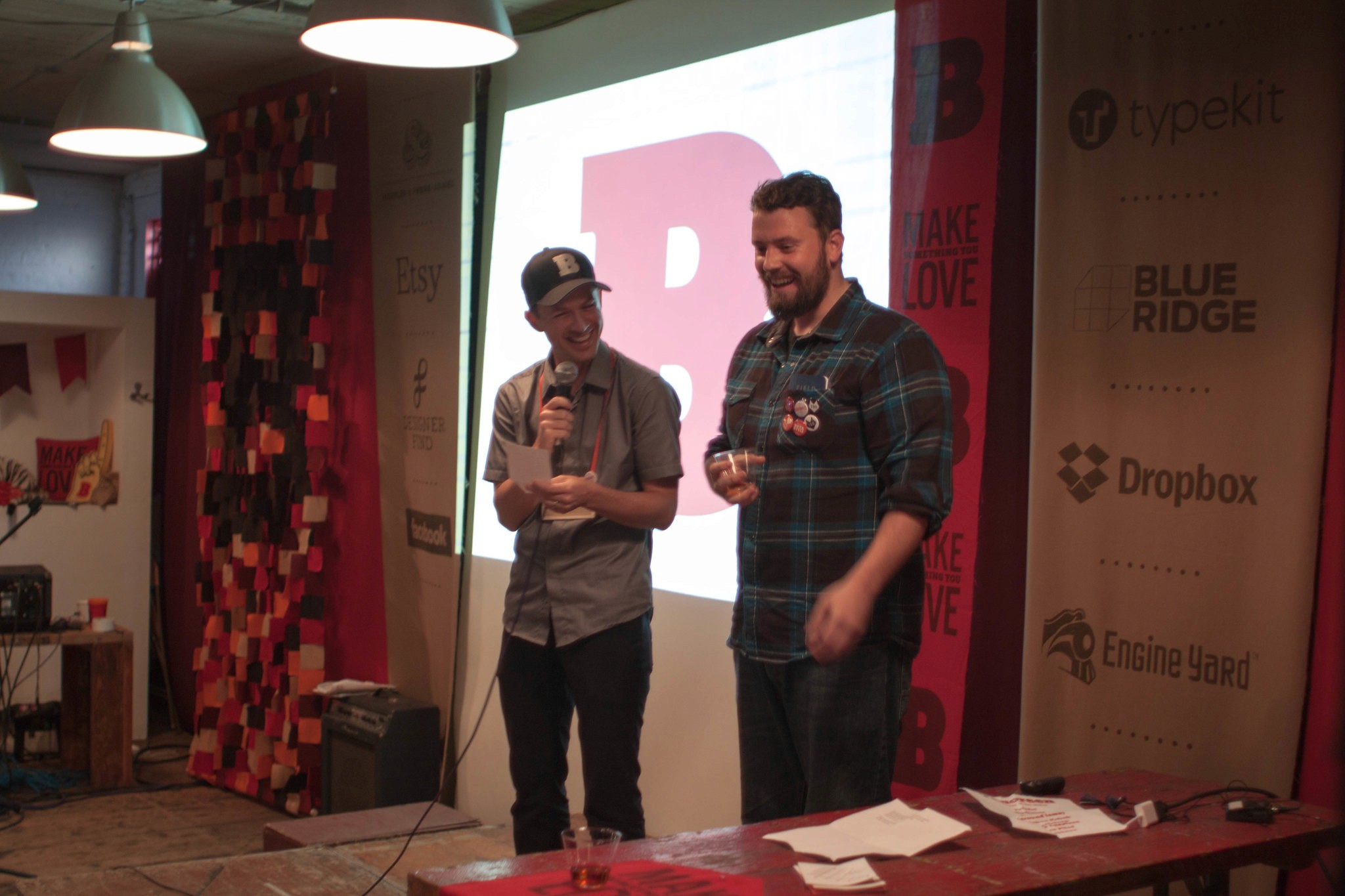



Last week I went to New York. Brooklyn to be more exact. The last few years there has been a conference, called Brooklyn Beta, that a lot of people are very excited about and tickets sell out fast. This year the organization decided to have a lottery and I was one of the lucky ones that was able to buy a ticket!
Last week I went to New York. Brooklyn to be more exact. The last few years there has been a conference, called Brooklyn Beta, that a lot of people are very excited about and tickets sell out fast. This year the organization decided to have a lottery and I was one of the lucky ones that was able to buy a ticket!
I booked a flight and Airbnb soon after and my employer was very generous and decided to cover part of the costs, thanks VI Company! I even added a few days off before and after the conference to experience the awesomeness that is New York City.
This year Chris & Cameron decided to make Brooklyn Beta better, even for those that didn't get a ticket, so they put together a week (including the weekend) full of events and they called it Beyond Beta. Everyone could pick and choose from events, including talks, hackathons, open houses, meetups, eating, drinking, knitting, and more.
I decided to join the Beyond Beta events on Tuesday and started with an open house at Etsy. Etsy is the world’s handmade marketplace and they have a pretty cool office, however there was no tour, just a brunch/hang-out where I got to meet some of the guys and girls going to the conference and beyond. I met a few guys and tagged along to Manhattan to go to the open house of the Bitly-offices.
Here we saw Jack Cheng, who led a fun, informative hour of discourse on the Slow Web and where this whole internet thing-y is headed.
After this session we walked from Chelsea to the Meatpacking District to visit the Chartbeat office. Megan Fischer showed us around and we went to Betaworks offices as well. Since we were close to the Highline we ate a nice lunch at The Standard Bar & Grill, why not? :)
We went back to Brooklyn, to the Invisible Dog where the conference is held. This is normally an art gallery and it shows: cool wooden floors and ceilings and brick walls, great for a conference like this. Etsy had provided a Screen Printing setup where I printed my own shirt. Bought a keychain as well and then it was time to go to Hyperakt’s Backyard Party. They had a keg (translation: free beer), and all the fixins for delicious s'mores. I've been an admirer of their work for some time, so it was nice to meet Deroy and the rest of the team. I also met with a couple of people I “know from the internet” like the guys from Oak Studios, Jessica & Russ and Robert Eerhart. The folks from Mailchimp had an open-bar at the Clover Club, so naturally we went there, and naturally it was full. Outside I met Maykel Lomans, Dutch designer at Instagram and Able Paris, designer at Big Spaceship. We went to Brooklyn Social for an Old Fashioned. Then we went back to the Clover Club for drinks: a great time and the conference hadn't even started!
Brooklyn Beta 2012 – Day 1
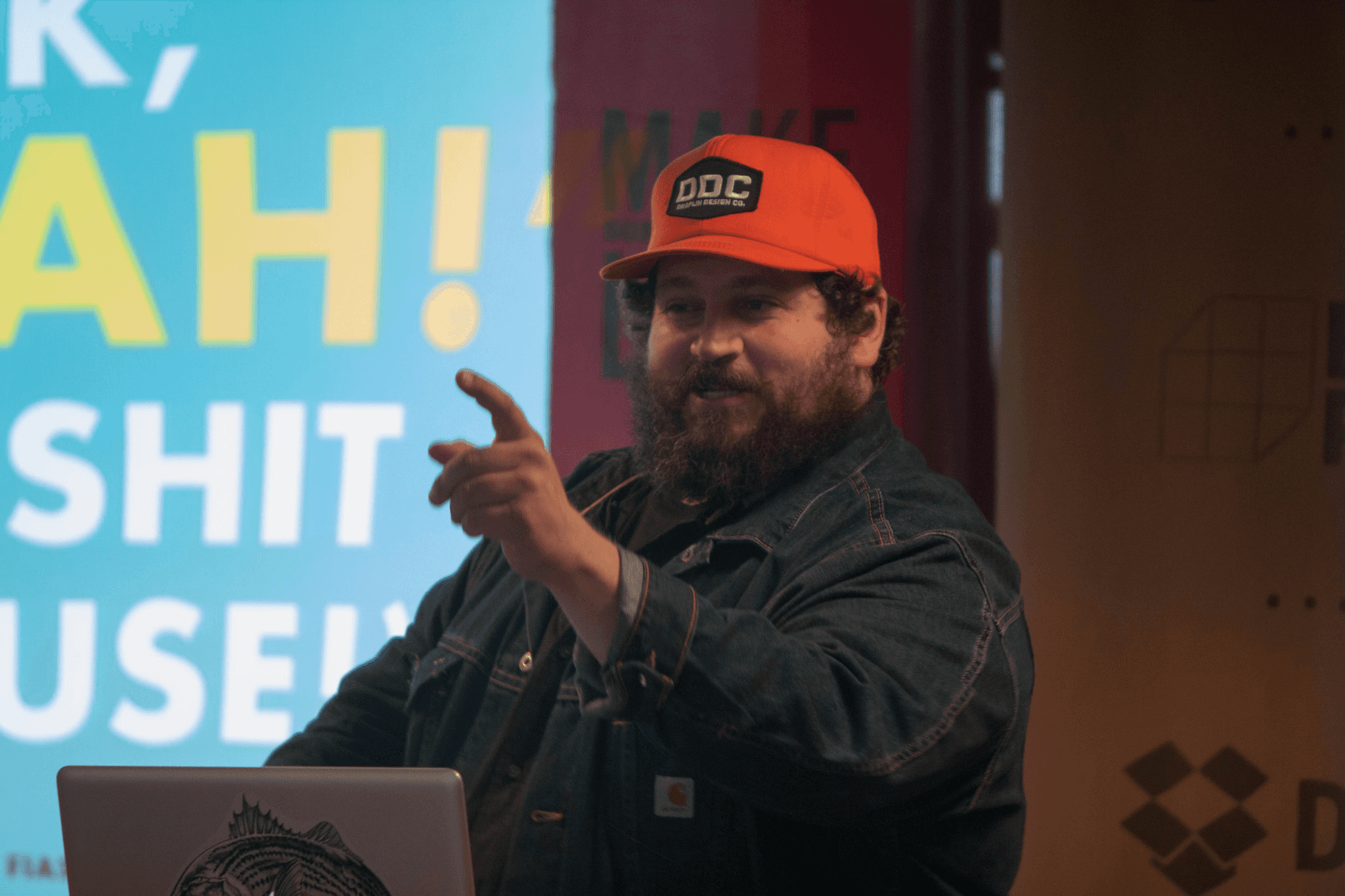
The first day started off with Aaron James Draplin, a designer from the Midwest. His presentation was awesome, what a funny guy. Some of the thing he talked about I already saw in another talk, but it was still cool to see him talk so passionately about working for Obama (“The Man!”) and John Hughes (“When Farmer Ted calls, do the f-ing job!”).
Some quotes from his talk: “Get cosmic + Celebrate the unsung heroes of design + Work hard and love this shit!”
During the summer Brooklyn Beta held Summer Camp to help designer-developer teams build the next generation of web products and change the world. During the conference we saw video’s of these products First up was “Maker’s Row”. Their mission is to make American manufacturing accessible. Whether you’re a company or individual, we are providing unparalleled access to large and small factories in the USA. After that came “Skillcrush” a community-driven, fun way to learn new tech skills and share these with others.
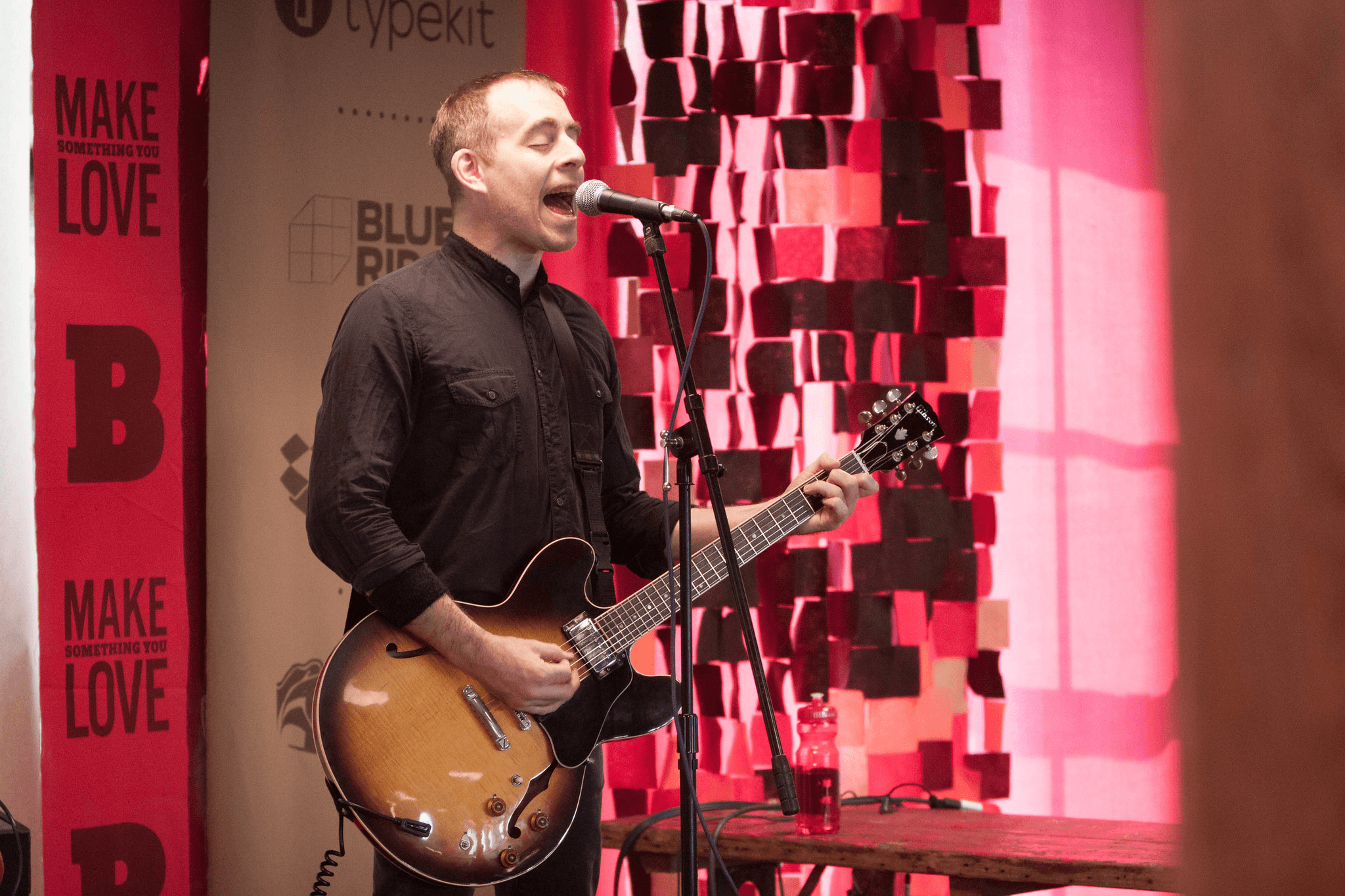
Then it was time for a musical break delivered by Ted Leo.
The next talk was by Alex Payne, who works for Simple, a fee-free, customer-friendly, beautifully designed online banking service. Before that he worked as an engineer at Twitter. He talked about figuring out what matters and the topics that you need to deal with like: “jurisprudence, economics, ethics and aesthetics. He had to deal with lots of nay-sayers and investors, but it is really rewarding. “You need to love it, to do it!”.
Lunch was excellent hot dogs from Bark.
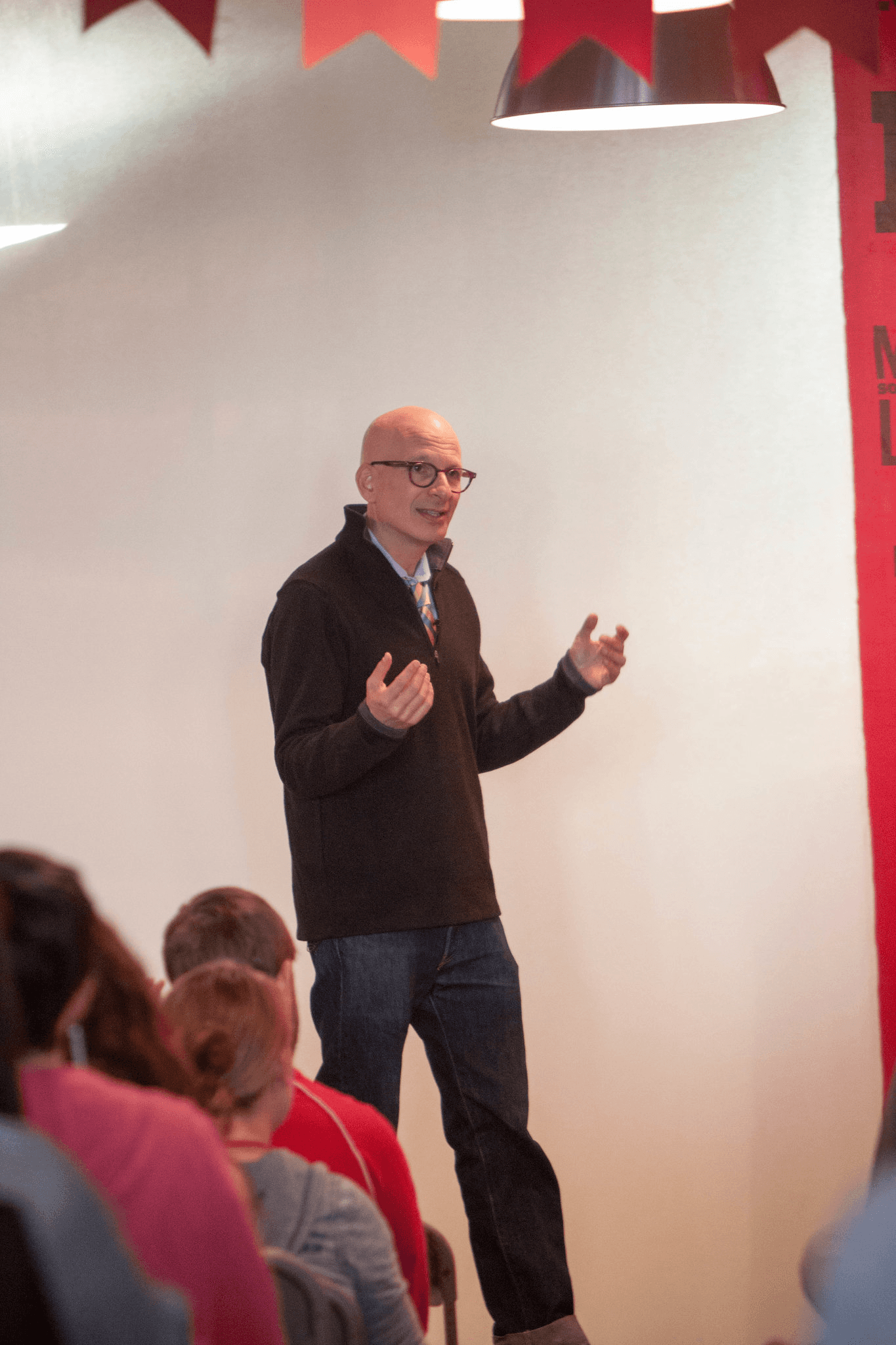
Seth Godin (an American entrepreneur, author and public speaker) was next and one of the many things he talked about was Lego. They almost went out-of-business because they only made blocks that do multiple things. You’d have to use your imagination to build. But only when they made kits that do only one thing did they survive. How sad! Revolutions: they destroy the perfect and enable the impossible. Making versus Assembling: when you are doing something that might not work, you are doing something interesting. If you’re not, you are just following instructions. You can’t yell at the masses anymore, they’re trying to avoid you. You need to whisper into the ears of those who want to hear from you. You need to tell a story! Permission marketing: would people miss you if you were gone? If Linkedin stopped sending you emails all the time, would you ask them why they stopped?
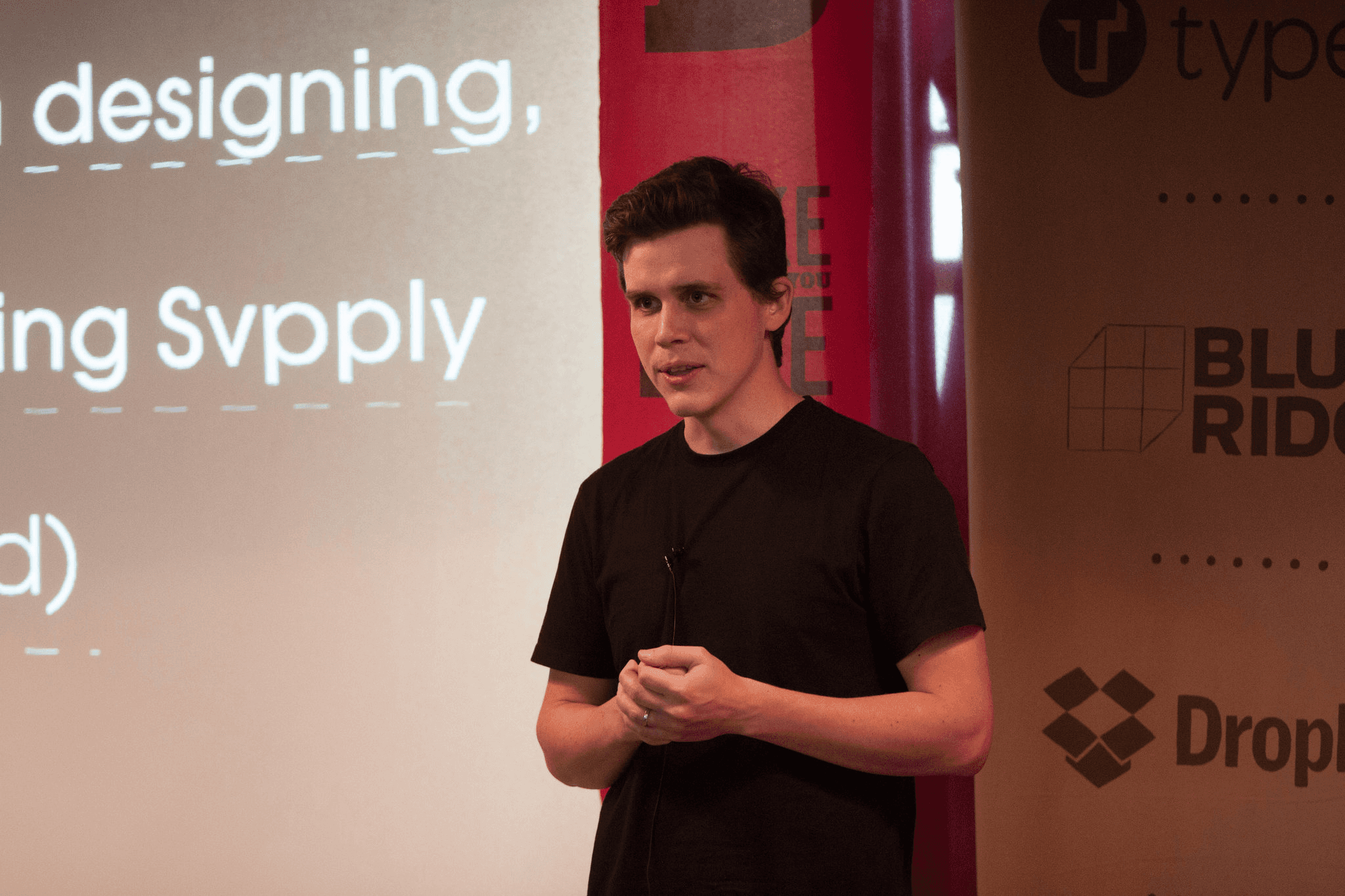
Ben Pierat, former designer and ceo of Svpply, a curated collection of the world’s best products and stores. A few months ago he sold it to eBay and he showed us 6 lessons from leading and selling Svpply:
Pursuing scale can cloud the mind and poison your product: he launched Svpply in October 2009 and it became popular very quickly. It was invite-only and he got many emails from VC’s wanting to invest. He took funding and in 2011 Svpply “plateaued”, meaning the growth was gone.
Business people talk and they are professional talkers: one of the VC’s made some empty promises, he let another VC go and ended up with no investors at all.
I am capable of ruining a company through Pride, Fear and Stubbornness.
Hiring for Culture was absolutely the right way to do it. He learned that his designs are capable of disrupting billion dollar markets.
People are the medium: not the pixels.
I love the internet. Ben wants to build for the web.
Another Summer Camp demo: Farmstand: making it easy to discover and share the best of your local farmers market.
Kyle Neath, designer at GitHub, started with Conway’s law: “organizations which design systems are constrained to produce designs which are copies of the communication structures of these organizations” and “Have nothing in your houses that you don’t know to be useful or believe to be beautiful”, by William Morris. “We are driven by autonomy, mastery and purpose. At Github there are no managers, just 123 employees. They favor leadership over management. His advice: build your own tools and make them beautiful: you’ll use it more.
Then it was time for dinner, supplied by Mile End Delicatessen and beer by Sixpoint Brewery. What an awesome first day. And there’s still two days to go!
I booked a flight and Airbnb soon after and my employer was very generous and decided to cover part of the costs, thanks VI Company! I even added a few days off before and after the conference to experience the awesomeness that is New York City.
This year Chris & Cameron decided to make Brooklyn Beta better, even for those that didn't get a ticket, so they put together a week (including the weekend) full of events and they called it Beyond Beta. Everyone could pick and choose from events, including talks, hackathons, open houses, meetups, eating, drinking, knitting, and more.
I decided to join the Beyond Beta events on Tuesday and started with an open house at Etsy. Etsy is the world’s handmade marketplace and they have a pretty cool office, however there was no tour, just a brunch/hang-out where I got to meet some of the guys and girls going to the conference and beyond. I met a few guys and tagged along to Manhattan to go to the open house of the Bitly-offices.
Here we saw Jack Cheng, who led a fun, informative hour of discourse on the Slow Web and where this whole internet thing-y is headed.
After this session we walked from Chelsea to the Meatpacking District to visit the Chartbeat office. Megan Fischer showed us around and we went to Betaworks offices as well. Since we were close to the Highline we ate a nice lunch at The Standard Bar & Grill, why not? :)
We went back to Brooklyn, to the Invisible Dog where the conference is held. This is normally an art gallery and it shows: cool wooden floors and ceilings and brick walls, great for a conference like this. Etsy had provided a Screen Printing setup where I printed my own shirt. Bought a keychain as well and then it was time to go to Hyperakt’s Backyard Party. They had a keg (translation: free beer), and all the fixins for delicious s'mores. I've been an admirer of their work for some time, so it was nice to meet Deroy and the rest of the team. I also met with a couple of people I “know from the internet” like the guys from Oak Studios, Jessica & Russ and Robert Eerhart. The folks from Mailchimp had an open-bar at the Clover Club, so naturally we went there, and naturally it was full. Outside I met Maykel Lomans, Dutch designer at Instagram and Able Paris, designer at Big Spaceship. We went to Brooklyn Social for an Old Fashioned. Then we went back to the Clover Club for drinks: a great time and the conference hadn't even started!
Brooklyn Beta 2012 – Day 1

The first day started off with Aaron James Draplin, a designer from the Midwest. His presentation was awesome, what a funny guy. Some of the thing he talked about I already saw in another talk, but it was still cool to see him talk so passionately about working for Obama (“The Man!”) and John Hughes (“When Farmer Ted calls, do the f-ing job!”).
Some quotes from his talk: “Get cosmic + Celebrate the unsung heroes of design + Work hard and love this shit!”
During the summer Brooklyn Beta held Summer Camp to help designer-developer teams build the next generation of web products and change the world. During the conference we saw video’s of these products First up was “Maker’s Row”. Their mission is to make American manufacturing accessible. Whether you’re a company or individual, we are providing unparalleled access to large and small factories in the USA. After that came “Skillcrush” a community-driven, fun way to learn new tech skills and share these with others.

Then it was time for a musical break delivered by Ted Leo.
The next talk was by Alex Payne, who works for Simple, a fee-free, customer-friendly, beautifully designed online banking service. Before that he worked as an engineer at Twitter. He talked about figuring out what matters and the topics that you need to deal with like: “jurisprudence, economics, ethics and aesthetics. He had to deal with lots of nay-sayers and investors, but it is really rewarding. “You need to love it, to do it!”.
Lunch was excellent hot dogs from Bark.

Seth Godin (an American entrepreneur, author and public speaker) was next and one of the many things he talked about was Lego. They almost went out-of-business because they only made blocks that do multiple things. You’d have to use your imagination to build. But only when they made kits that do only one thing did they survive. How sad! Revolutions: they destroy the perfect and enable the impossible. Making versus Assembling: when you are doing something that might not work, you are doing something interesting. If you’re not, you are just following instructions. You can’t yell at the masses anymore, they’re trying to avoid you. You need to whisper into the ears of those who want to hear from you. You need to tell a story! Permission marketing: would people miss you if you were gone? If Linkedin stopped sending you emails all the time, would you ask them why they stopped?

Ben Pierat, former designer and ceo of Svpply, a curated collection of the world’s best products and stores. A few months ago he sold it to eBay and he showed us 6 lessons from leading and selling Svpply:
Pursuing scale can cloud the mind and poison your product: he launched Svpply in October 2009 and it became popular very quickly. It was invite-only and he got many emails from VC’s wanting to invest. He took funding and in 2011 Svpply “plateaued”, meaning the growth was gone.
Business people talk and they are professional talkers: one of the VC’s made some empty promises, he let another VC go and ended up with no investors at all.
I am capable of ruining a company through Pride, Fear and Stubbornness.
Hiring for Culture was absolutely the right way to do it. He learned that his designs are capable of disrupting billion dollar markets.
People are the medium: not the pixels.
I love the internet. Ben wants to build for the web.
Another Summer Camp demo: Farmstand: making it easy to discover and share the best of your local farmers market.
Kyle Neath, designer at GitHub, started with Conway’s law: “organizations which design systems are constrained to produce designs which are copies of the communication structures of these organizations” and “Have nothing in your houses that you don’t know to be useful or believe to be beautiful”, by William Morris. “We are driven by autonomy, mastery and purpose. At Github there are no managers, just 123 employees. They favor leadership over management. His advice: build your own tools and make them beautiful: you’ll use it more.
Then it was time for dinner, supplied by Mile End Delicatessen and beer by Sixpoint Brewery. What an awesome first day. And there’s still two days to go!
Brooklyn Beta 2012 – Day 2
The second day started with a talk by Corey Booker, Mayor of Newark, New Jersey. He’s known for being very active in social media and is founder of Waywire, a video social network dedicated to giving young people a voice about the issues that matter most. Corey is a professional speaker and it shows. He talked about so many issues, used so many one-liners, it was difficult to keep up.
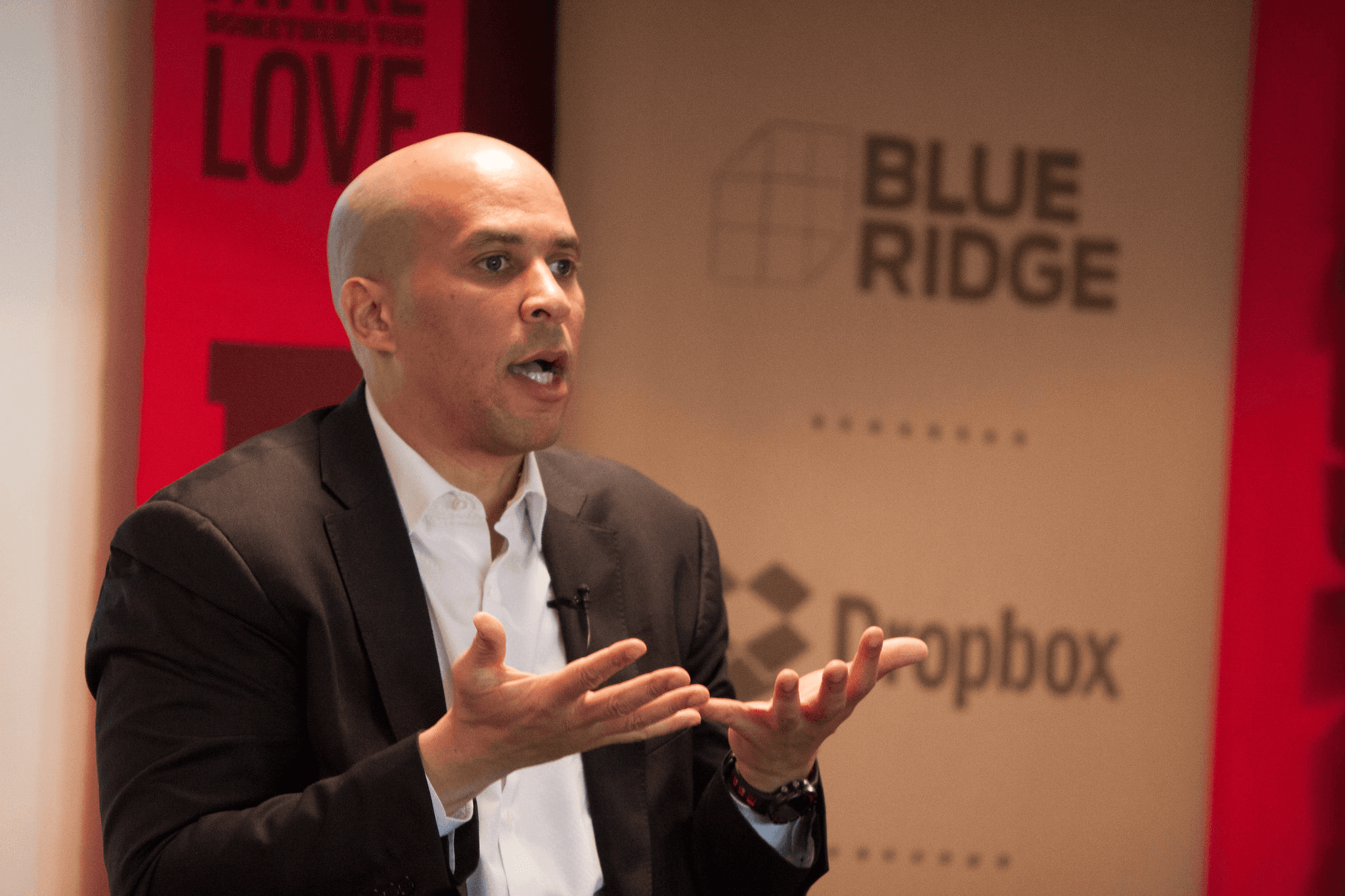
Some quotes from his talk:
“A lack of education is a threat to our economy”
“It’s cheaper to pay for education than ignorance”
“Bad people are elected when good people don’t vote.”
“Prisons are the publicly funded warehouses of human potential.”
“You can accept things as they are or take responsibility for changing them!”
It was entertaining to hear him talk, especially when he took questions from the audience and answered them all using examples of his own experiences as a politician. And Cory is a big geek too:

Next up was Scott Belsky from Behance, a showcase for creative professionals across industries. He talked about starting the network with almost no money, selling stationery to be able to survive. When they googled “behance” it asked: “Do you mean enhance?” Behance is mission driven, not medium driven. They organize conferences as well. ”Gain confidence from doubt. If everybody tells you that you are crazy, you are either crazy, or you are really on to something.”
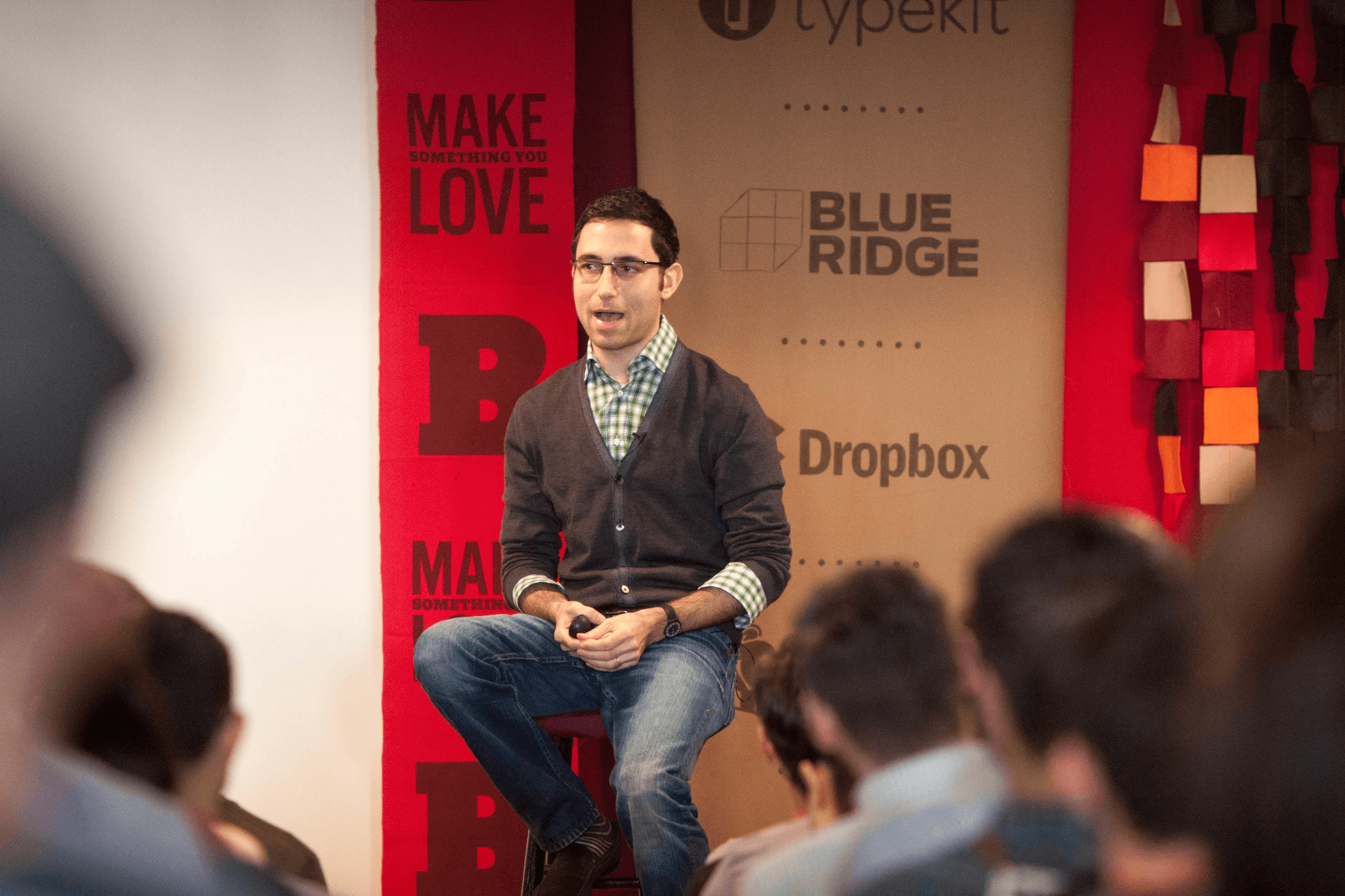
We saw demo-video’s of The Nounproject, a platform empowering the community to build a global visual language that everyone can understand. And Superhuman, a service enabling people to be Superhuman (vague, I know, but it’s kinda like a task and errand service).
Cameron Moll came on stage to present the progress of his newest artwork entitled “The Great Bridge”, referencing the book about building the Brooklyn Bridge. He has made a similar piece in 2010: The Colosseum, a letterpress poster handcrafted character by character over the course of roughly 250 hours. This time he brought his Pantone guide to capture the right colors of the bridge. He’s still working on it, but hopefully it’s available by the end of the year.
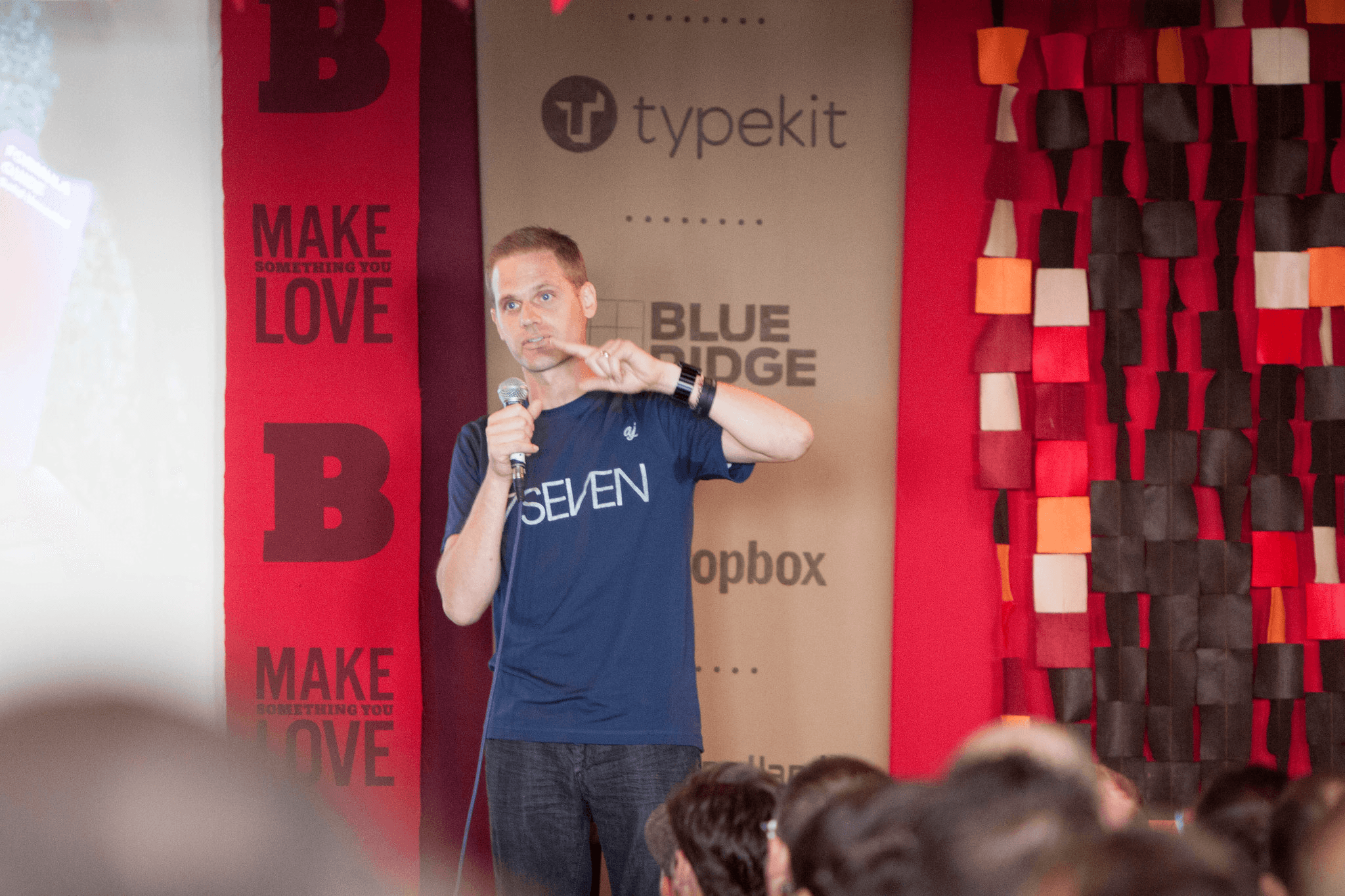
Jay Parkinson started a medical practice in 2007 where patients could visit his site, choose when they want an appointment, input their symptoms and Jay would make a house call. The patients would pay via paypal and they would follow up by email, IM, videochat or in person. He had about 10% overhead, where normal doctor practices have about 75% overheid.
This concept grew into Hello Health, so other doctors could practice this way. Hello Health is a mixture of a secure social network and electronic medical record that enables doctors and patients to connect both in their office and online via email, IM, and video chat.
He recently launched Sherpaa, a health service in NYC in February 2012. Sherpaa connects employees to our group of doctors via email and phone 24/7 to solve health problems. Where traditional hospitals are designed like a factory that produces anything (inefficient) they create a service that has less overhead and is smarter, giving patients a better experience.
Ted Nelson was next. He’s an American sociologist, philosopher, and pioneer of IT. He coined the terms "hypertext" and "hypermedia" in 1963 and published them in 1965. A genuine old-school internet geek. His eccentric way of speaking reminded me a little of Doc Brown.
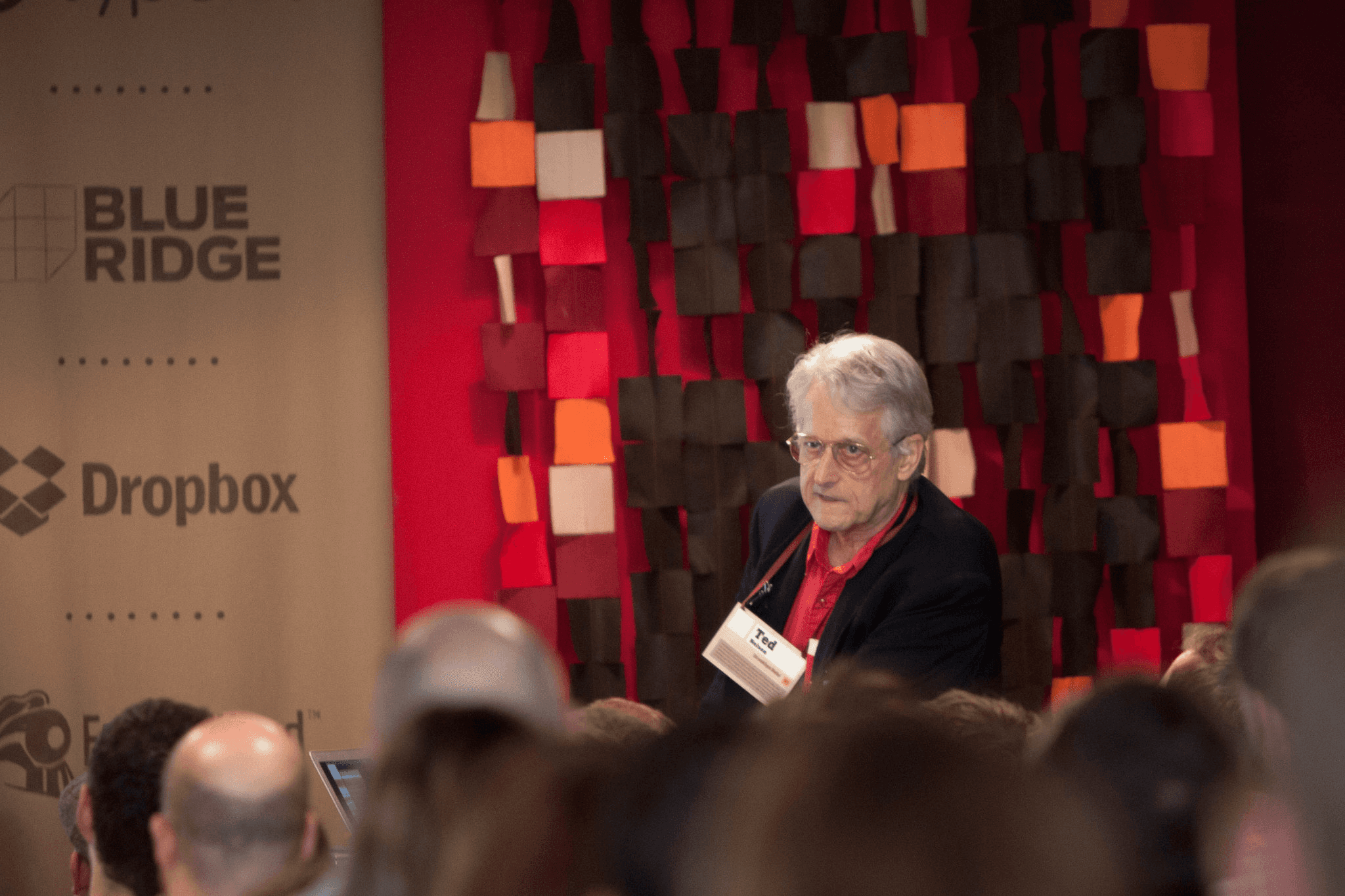
He said: “I am going to talk about when the world was young, you could invent anything and there were no computers cheaper than $100,000”. “Software design is like movies: it’s events on a screen that have consequences. Steve Jobs was a horrible human being, but a great movie director. Software design is like movie making, it touches the heart and the mind of the user.” I could follow his talk, until he started talking about Xanadu, ZigZag and Smorphing (swooping + morphing).
Heather Payne was next. She spent most of her first year post-graduation living in China and working towards a Masters in International Relations. That's also where she first learned to build a self-hosted Wordpress site (a blog about fitness, which she sold after a year). Upon her return to Toronto, she excelled in a corporate marketing role before her desire to join a startup became too strong to ignore.
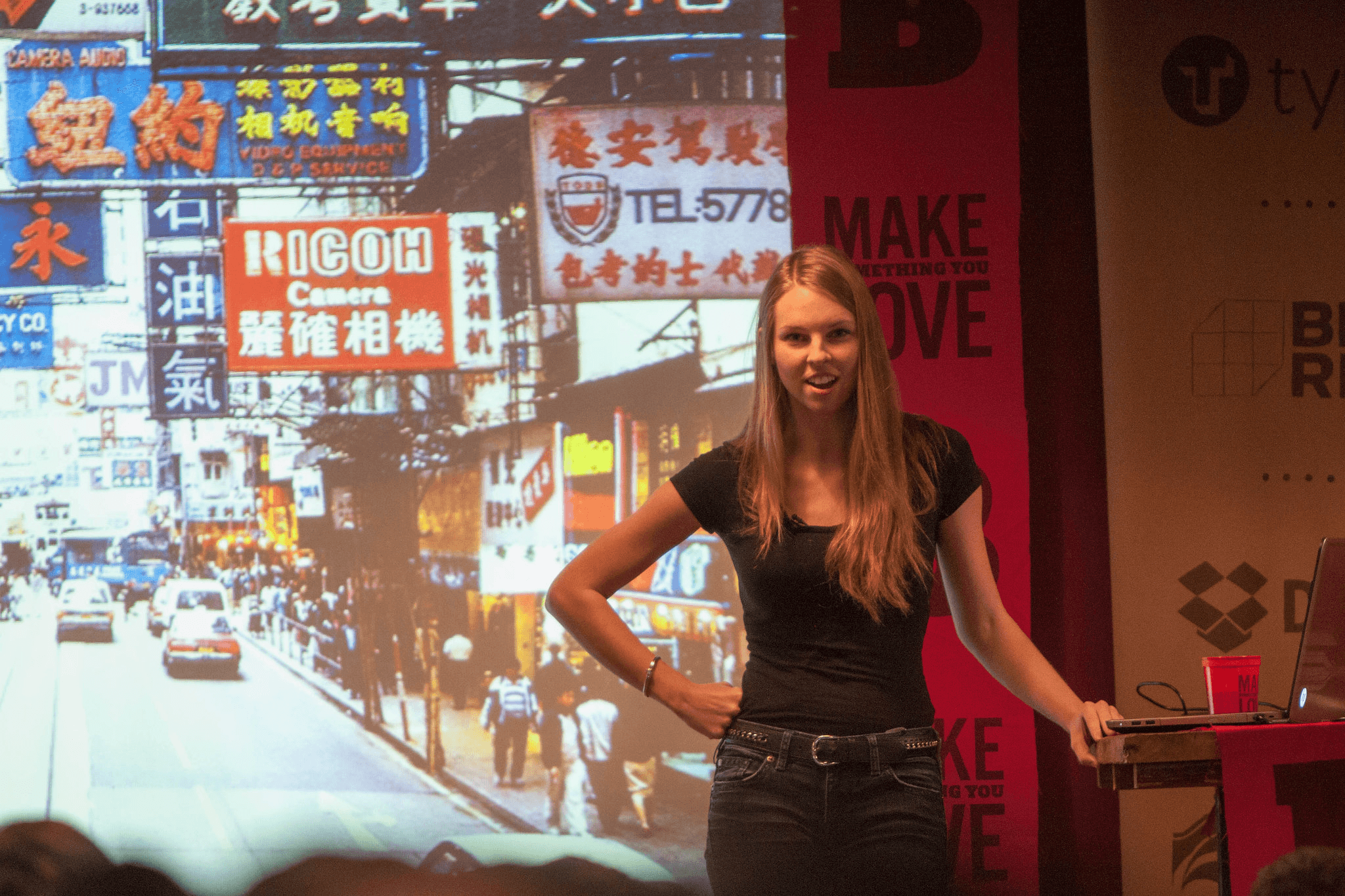
In July 2011, Heather joined a Toronto-based, three-person tech startup building on the Facebook platform. Her experience there (in a non-technical role) has made her even more determined to learn to program - so that she can contribute to building something of her own one day. This all led up to her founding Ladies Learning Code, a not-for-profit organization working to empower everyone to learn basic, beginner-level programming and other technical skills.
Dinner this time was pizza from Sam’s. It goes without saying that this was de-li-cious! The after-conference-drink’s were at Floyd’s courtesy of Facebook.
Brooklyn Beta 2012 – Day 3
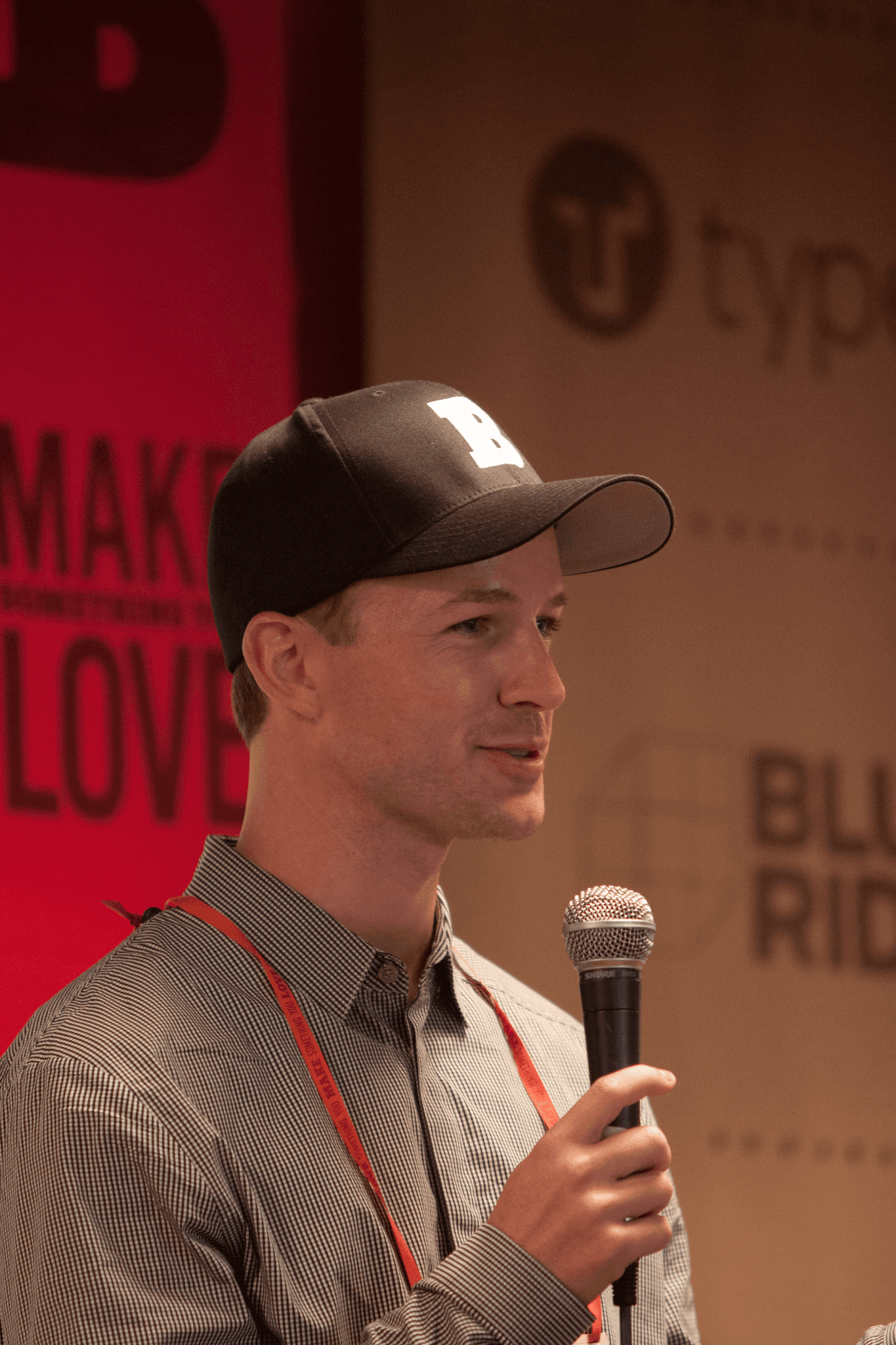
The last day of the conference started with Chris Shiflett sharing two lessons he learned:
It's okay to miss out.
“We're a community of people who love to sweat the details, but, sometimes, maybe the details don't matter. … Time doesn't move differently for us than it does for people who live a slow-paced life. We're just too close to the ground. So, the next time you feel like you're missing out, stop it. Zoom out a little bit and give yourself some space and some perspective, so you can focus on what matters.”Being the best is not good enough.
“The Internet is the opportunity of our generation, and we've barely begun to tap its potential. … We're the lucky ones who have the power to change the world, so what are we waiting for?”
Next up was Cameron Koczon, intro-ed by Miss Jepsen, reminding us this is’t just a conference, it’s more like a community. We should all expand Brooklyn Beta, keep the momentum and up its impact. Next year should be more about what we have achieved, with the community's help.
Then Maciej Ceglowski came on stage. He’s the founder of Pinboard, a fast, no-nonsense bookmarking site. He told passionately about his career, how he started with a site where users can submit bed bug reports, the Bed Bug Registry. How he wanted to destroy bed bugs with programming :) his site became a success, through ad revenue he could support his bookmarking-site. Yahoo announced that they would close their bookmarking-site Delicious, and Pinboard was the best alternative. Because of the popularity of the Bed Bug-site Maciej had enough bandwidth to cope with the traffic to Pinboard. His payment model, a small one-time fee, resulted in earning $100.000 in one week. “Don’t get in the way when people want to give you money” All of a sudden he had a viable bookmarking site, and he had no idea what he was doing. His advice:
Be lucky
Charge money
Barely Succeed:
Not everybody or everything has to grow super-big and scale like crazy. “Anybody can make $20/month, if you can’t, you need to stop, you have anti-talent for it.” … “Success feels not much different from failure, but you’re not allowed to stop”.
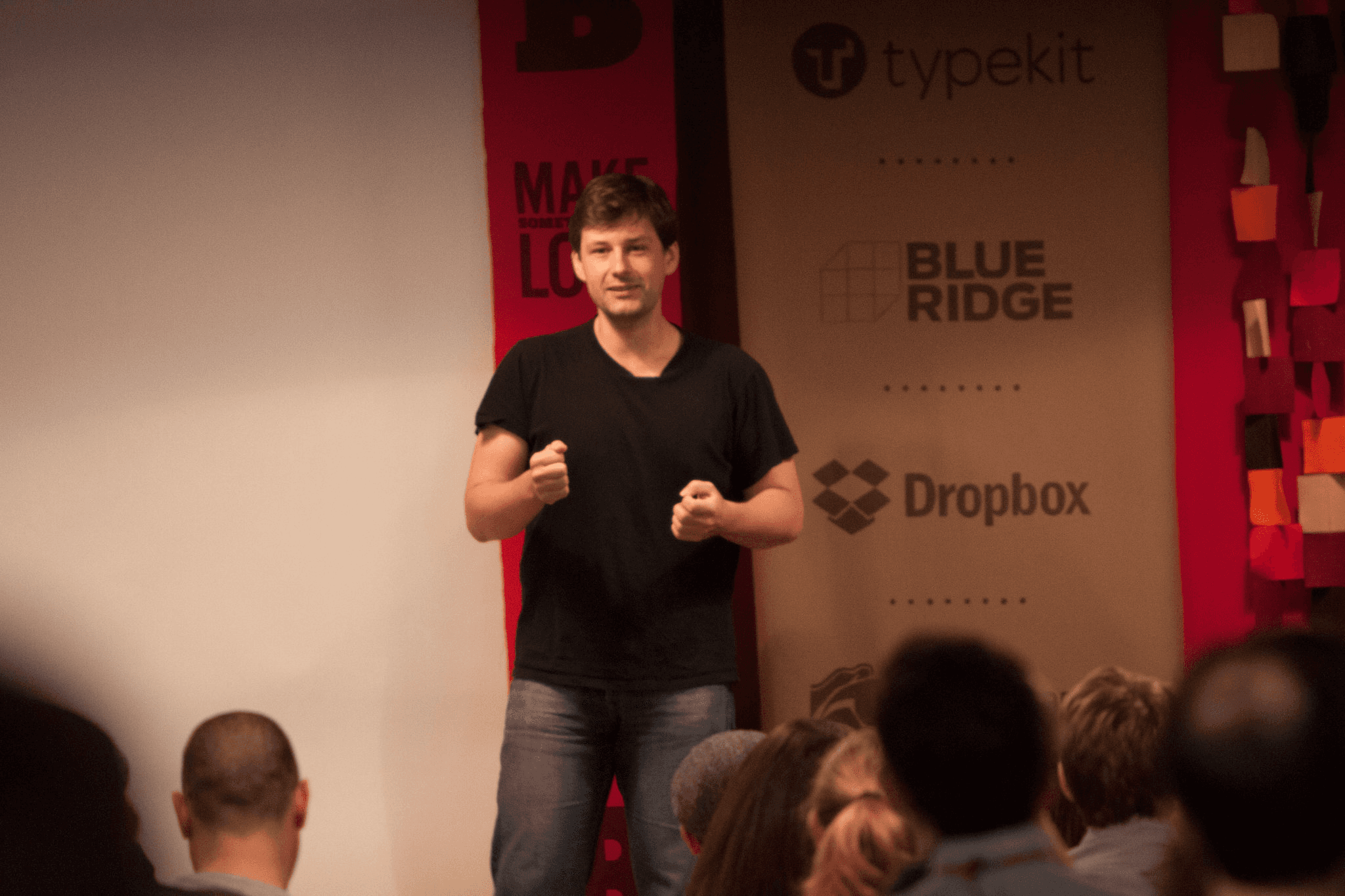
He ended his talk with this example: in 1985 a small group of Polish technicians hacked a tv broadcast to add a ‘boycott-the-elections’-message, because the elections were corrupt. That was their way of using their skills to do really meaningful work. “We really need to step up our game.”
Next came a couple more demo’s: Sticker.fm, a fun way to chain together videos with your friends. And Webe.at, allows you to create totally custom calendars and broadcast the stuff on them in huge ways.
Lunch was burgers from Bark and music was provided by Amy Klein and Clyn Brooks

Mandy Brown talked about a new start-up she founded, but it was off-record, so I can’t say what it is. I can say the rest of the team consists of Ethan Marcotte, Jason Santa Maria and David Yee, so it’ll probably be awesome. (The company was Editorially)
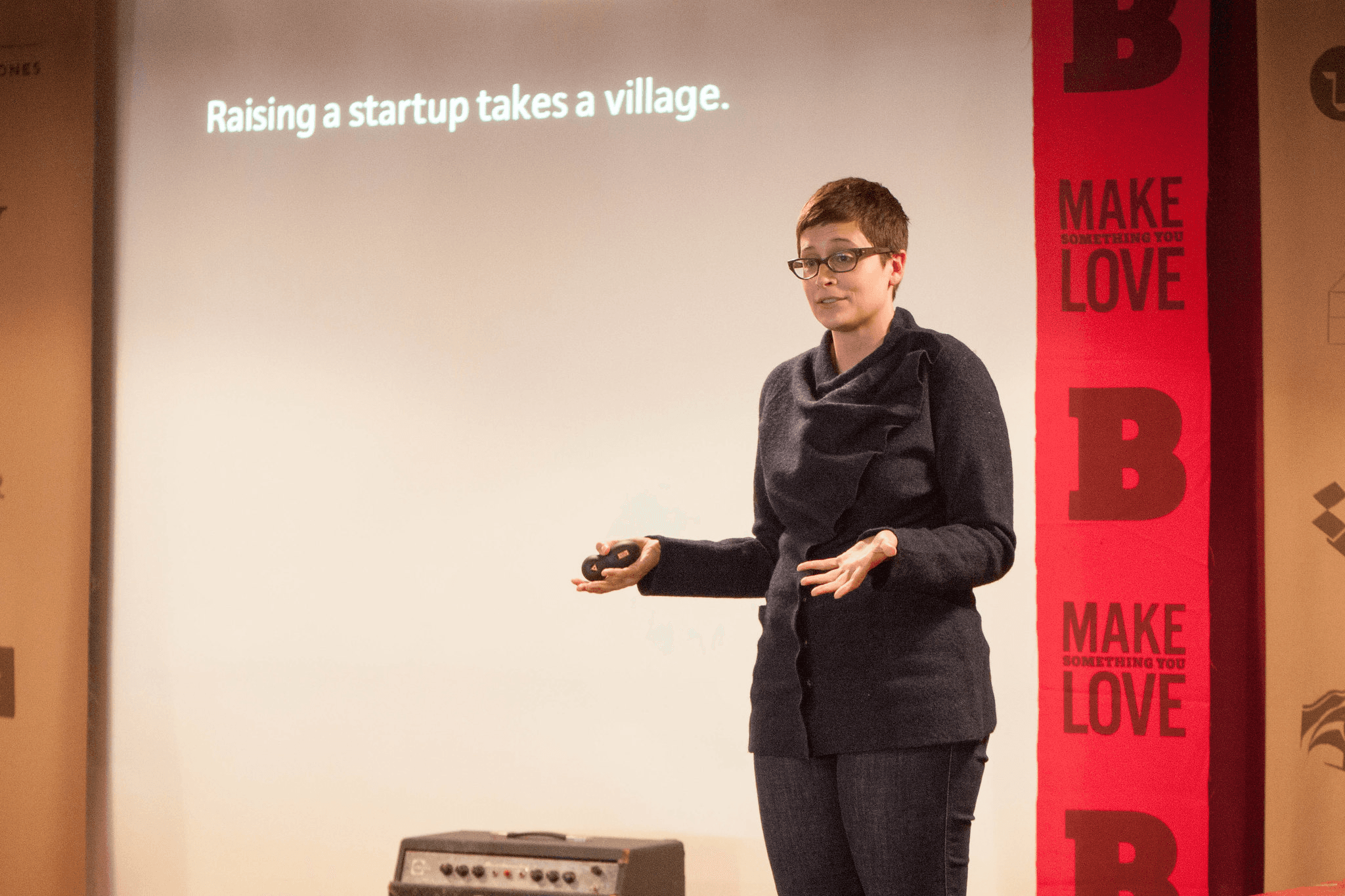
Some of the tips she gave: “Be yourself, Write it down, Make a deadline, Clearly define roles, Take equity up front and Write it the f down.” :) Looking forward to the launch in 2013!
Rob Weychert was next. He gave a presentation about the Air Guitar World Championships in which he performs as Windhammer and we learned that “Air Guitar is the brightly lit version of figure skating”.
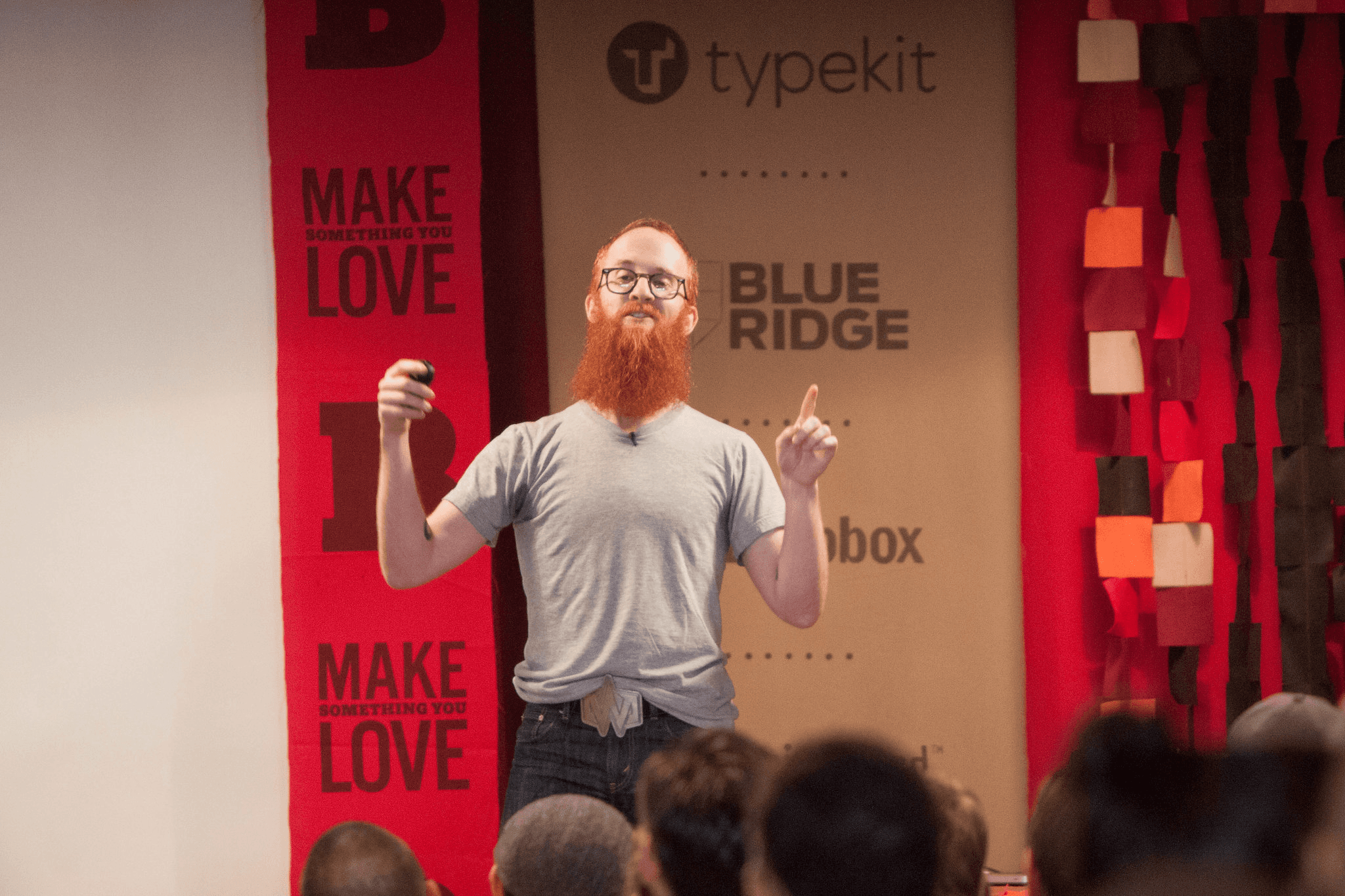
After the break Ian Coyle talked about “Motorcycles and the art of not planning”. Ian is known for working on the Nike Better World website, a site (offline now) that pioneered the parallax scrolling effect in 2011. He told us that a mistake in the script resulted in them re-doing the site a couple of days before a presentation, and that accident resulted in that well-known site.
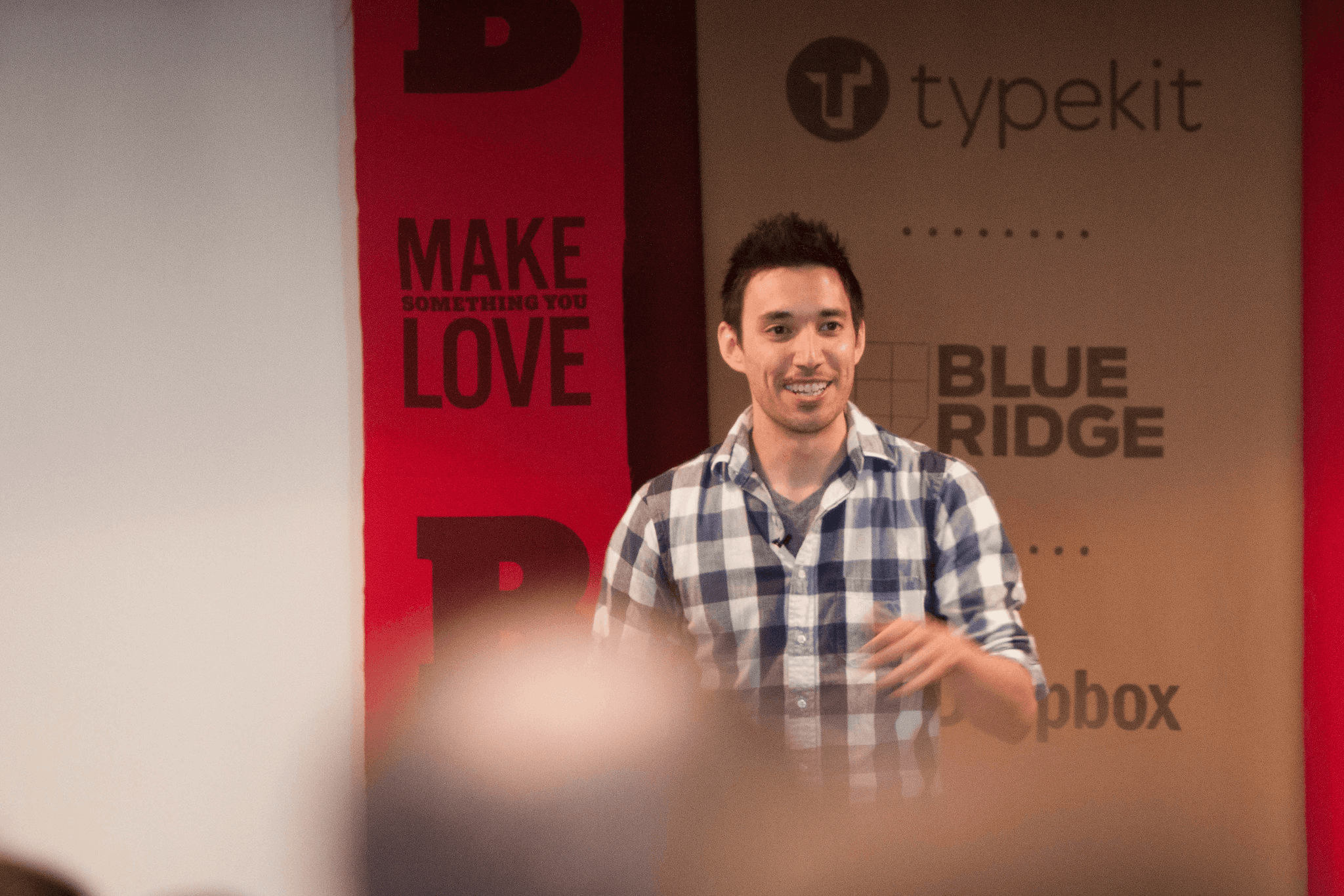
He went on to talk about building his own motorcycle and using a motorcycle-cable on his letterpress. His advice: “Don’t just talk about your plans, just start them all and find the one that sticks”.
Again a couple more demo’s: Garnish: an easy menu for restaurants, Collabfinder, a place to find great collaborators for your next project, Reading.am a website for sharing what you’re reading. Jukely, an app that connects people and friends with music and live shows.
Brooklyn Beta collected a bit of whimsical data about the attendees of the conference, otherwise known as "the people who make the internet". Hyperakt helped them visualize it and turned the data into a great infographic.
Next up was Baratunde Thurston, politically-active, technology-loving comedian from the future. He’s the author of “How to be Black”, performs standup comedy regularly in New York City, resides in Brooklyn, lives on Twitter and has over 30 years experience being black. :) His talk was very funny, some highlights: Comedy Hack Day, Spacebar to Moneyshot, Shoutroulette, shout at an idiot about a thing, and Location Based Racism.
Song-a-day-man ended the conference with “The Brooklyn Beta Theme Song” with a fun summary of the talks and event:
(I’m in it! Go to 6:46 to see me eating a pizza, obviously)
We ended the day with tacos, beer and more drinks at 61 local.
And that’s it. Thanks for reading, want more?
Check out Eva Lottchen’s awesome sketchnotes
More photo’s by Laughlin Hardy, Maykel Loomans, Chris Casciano, Marc Thiele and Timo Kuhn
Brooklyn Beta 2012 – Day 2
The second day started with a talk by Corey Booker, Mayor of Newark, New Jersey. He’s known for being very active in social media and is founder of Waywire, a video social network dedicated to giving young people a voice about the issues that matter most. Corey is a professional speaker and it shows. He talked about so many issues, used so many one-liners, it was difficult to keep up.

Some quotes from his talk:
“A lack of education is a threat to our economy”
“It’s cheaper to pay for education than ignorance”
“Bad people are elected when good people don’t vote.”
“Prisons are the publicly funded warehouses of human potential.”
“You can accept things as they are or take responsibility for changing them!”
It was entertaining to hear him talk, especially when he took questions from the audience and answered them all using examples of his own experiences as a politician. And Cory is a big geek too:

Next up was Scott Belsky from Behance, a showcase for creative professionals across industries. He talked about starting the network with almost no money, selling stationery to be able to survive. When they googled “behance” it asked: “Do you mean enhance?” Behance is mission driven, not medium driven. They organize conferences as well. ”Gain confidence from doubt. If everybody tells you that you are crazy, you are either crazy, or you are really on to something.”

We saw demo-video’s of The Nounproject, a platform empowering the community to build a global visual language that everyone can understand. And Superhuman, a service enabling people to be Superhuman (vague, I know, but it’s kinda like a task and errand service).
Cameron Moll came on stage to present the progress of his newest artwork entitled “The Great Bridge”, referencing the book about building the Brooklyn Bridge. He has made a similar piece in 2010: The Colosseum, a letterpress poster handcrafted character by character over the course of roughly 250 hours. This time he brought his Pantone guide to capture the right colors of the bridge. He’s still working on it, but hopefully it’s available by the end of the year.

Jay Parkinson started a medical practice in 2007 where patients could visit his site, choose when they want an appointment, input their symptoms and Jay would make a house call. The patients would pay via paypal and they would follow up by email, IM, videochat or in person. He had about 10% overhead, where normal doctor practices have about 75% overheid.
This concept grew into Hello Health, so other doctors could practice this way. Hello Health is a mixture of a secure social network and electronic medical record that enables doctors and patients to connect both in their office and online via email, IM, and video chat.
He recently launched Sherpaa, a health service in NYC in February 2012. Sherpaa connects employees to our group of doctors via email and phone 24/7 to solve health problems. Where traditional hospitals are designed like a factory that produces anything (inefficient) they create a service that has less overhead and is smarter, giving patients a better experience.
Ted Nelson was next. He’s an American sociologist, philosopher, and pioneer of IT. He coined the terms "hypertext" and "hypermedia" in 1963 and published them in 1965. A genuine old-school internet geek. His eccentric way of speaking reminded me a little of Doc Brown.

He said: “I am going to talk about when the world was young, you could invent anything and there were no computers cheaper than $100,000”. “Software design is like movies: it’s events on a screen that have consequences. Steve Jobs was a horrible human being, but a great movie director. Software design is like movie making, it touches the heart and the mind of the user.” I could follow his talk, until he started talking about Xanadu, ZigZag and Smorphing (swooping + morphing).
Heather Payne was next. She spent most of her first year post-graduation living in China and working towards a Masters in International Relations. That's also where she first learned to build a self-hosted Wordpress site (a blog about fitness, which she sold after a year). Upon her return to Toronto, she excelled in a corporate marketing role before her desire to join a startup became too strong to ignore.

In July 2011, Heather joined a Toronto-based, three-person tech startup building on the Facebook platform. Her experience there (in a non-technical role) has made her even more determined to learn to program - so that she can contribute to building something of her own one day. This all led up to her founding Ladies Learning Code, a not-for-profit organization working to empower everyone to learn basic, beginner-level programming and other technical skills.
Dinner this time was pizza from Sam’s. It goes without saying that this was de-li-cious! The after-conference-drink’s were at Floyd’s courtesy of Facebook.
Brooklyn Beta 2012 – Day 3

The last day of the conference started with Chris Shiflett sharing two lessons he learned:
It's okay to miss out.
“We're a community of people who love to sweat the details, but, sometimes, maybe the details don't matter. … Time doesn't move differently for us than it does for people who live a slow-paced life. We're just too close to the ground. So, the next time you feel like you're missing out, stop it. Zoom out a little bit and give yourself some space and some perspective, so you can focus on what matters.”Being the best is not good enough.
“The Internet is the opportunity of our generation, and we've barely begun to tap its potential. … We're the lucky ones who have the power to change the world, so what are we waiting for?”
Next up was Cameron Koczon, intro-ed by Miss Jepsen, reminding us this is’t just a conference, it’s more like a community. We should all expand Brooklyn Beta, keep the momentum and up its impact. Next year should be more about what we have achieved, with the community's help.
Then Maciej Ceglowski came on stage. He’s the founder of Pinboard, a fast, no-nonsense bookmarking site. He told passionately about his career, how he started with a site where users can submit bed bug reports, the Bed Bug Registry. How he wanted to destroy bed bugs with programming :) his site became a success, through ad revenue he could support his bookmarking-site. Yahoo announced that they would close their bookmarking-site Delicious, and Pinboard was the best alternative. Because of the popularity of the Bed Bug-site Maciej had enough bandwidth to cope with the traffic to Pinboard. His payment model, a small one-time fee, resulted in earning $100.000 in one week. “Don’t get in the way when people want to give you money” All of a sudden he had a viable bookmarking site, and he had no idea what he was doing. His advice:
Be lucky
Charge money
Barely Succeed:
Not everybody or everything has to grow super-big and scale like crazy. “Anybody can make $20/month, if you can’t, you need to stop, you have anti-talent for it.” … “Success feels not much different from failure, but you’re not allowed to stop”.

He ended his talk with this example: in 1985 a small group of Polish technicians hacked a tv broadcast to add a ‘boycott-the-elections’-message, because the elections were corrupt. That was their way of using their skills to do really meaningful work. “We really need to step up our game.”
Next came a couple more demo’s: Sticker.fm, a fun way to chain together videos with your friends. And Webe.at, allows you to create totally custom calendars and broadcast the stuff on them in huge ways.
Lunch was burgers from Bark and music was provided by Amy Klein and Clyn Brooks

Mandy Brown talked about a new start-up she founded, but it was off-record, so I can’t say what it is. I can say the rest of the team consists of Ethan Marcotte, Jason Santa Maria and David Yee, so it’ll probably be awesome. (The company was Editorially)

Some of the tips she gave: “Be yourself, Write it down, Make a deadline, Clearly define roles, Take equity up front and Write it the f down.” :) Looking forward to the launch in 2013!
Rob Weychert was next. He gave a presentation about the Air Guitar World Championships in which he performs as Windhammer and we learned that “Air Guitar is the brightly lit version of figure skating”.

After the break Ian Coyle talked about “Motorcycles and the art of not planning”. Ian is known for working on the Nike Better World website, a site (offline now) that pioneered the parallax scrolling effect in 2011. He told us that a mistake in the script resulted in them re-doing the site a couple of days before a presentation, and that accident resulted in that well-known site.

He went on to talk about building his own motorcycle and using a motorcycle-cable on his letterpress. His advice: “Don’t just talk about your plans, just start them all and find the one that sticks”.
Again a couple more demo’s: Garnish: an easy menu for restaurants, Collabfinder, a place to find great collaborators for your next project, Reading.am a website for sharing what you’re reading. Jukely, an app that connects people and friends with music and live shows.
Brooklyn Beta collected a bit of whimsical data about the attendees of the conference, otherwise known as "the people who make the internet". Hyperakt helped them visualize it and turned the data into a great infographic.
Next up was Baratunde Thurston, politically-active, technology-loving comedian from the future. He’s the author of “How to be Black”, performs standup comedy regularly in New York City, resides in Brooklyn, lives on Twitter and has over 30 years experience being black. :) His talk was very funny, some highlights: Comedy Hack Day, Spacebar to Moneyshot, Shoutroulette, shout at an idiot about a thing, and Location Based Racism.
Song-a-day-man ended the conference with “The Brooklyn Beta Theme Song” with a fun summary of the talks and event:
(I’m in it! Go to 6:46 to see me eating a pizza, obviously)
We ended the day with tacos, beer and more drinks at 61 local.
And that’s it. Thanks for reading, want more?
Check out Eva Lottchen’s awesome sketchnotes
More photo’s by Laughlin Hardy, Maykel Loomans, Chris Casciano, Marc Thiele and Timo Kuhn